One Symphony with Devin Patrick Hughes
A podcast that explores classical music’s relevance in our modern lives. Conductor Devin Patrick Hughes will share with you stories and conversations with musicians, composers, and artistic entrepreneurs that aim to unite us into one symphonic world. New episodes every other Monday.
Episodes
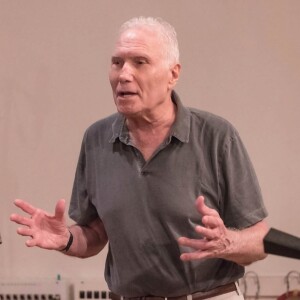
Monday Mar 24, 2025
Peter Drew, Composer of Life
Monday Mar 24, 2025
Monday Mar 24, 2025
On this episode of One Symphony, Devin Patrick Hughes sat down with Peter Drew, a symphonist and jazz composer, to discuss his diverse life journey and his debut symphony, Reminiscence. Drew, born in Europe and later a refugee in the United States, recounted his early musical awakenings. He was first intrigued by the sound of the harmonica his stepbrother gave him. However, his musical trajectory truly shifted when, around the age of eleven, he heard Toscanini conducting Beethoven's Ninth Symphony on the radio. This experience deeply resonated with him, particularly the Ode to Joy, which became the first tune he learned on the harmonica, despite not being able to read music.
Although initially captivated by classical music and Beethoven, Drew's path to becoming a composer was far from traditional. He pursued various careers, including working in film distribution, catering, teaching film studies, and being a social studies teacher. Throughout these experiences, music remained a constant presence in his life; he would often "noodle around" on the clarinet. It wasn't until later in life that he began to seriously study music, taking lessons from clarinet players and exploring jazz. He eventually started arranging music and studying composers like Sibelius.
When the conversation turned to his symphony, "Reminiscence," Drew emphasized the amalgamation of his varied musical tastes and life experiences. He described his influences as a "mélange" or "stew" ranging from the American Songbook to Carl Orff, Villa-Lobos, Beethoven, Brahms, Artie Shaw, and even global music like Songs of the Auvergne, Tuvan throat singing, and Raga. He explained that his compositional process often begins with a melody he likes, perhaps played on his clarinet. He then develops this initial phrase, ensuring a natural flow between musical ideas without dissonance, remaining within the realm of Romantic Classical music.
Hughes inquired about the technical aspects of translating these diverse elements into a cohesive symphony, including orchestration. Drew admitted that while he can conceive melodies, he needed assistance with the intricate instrumentation for a large symphony orchestra. He collaborated with an orchestrator to achieve the desired sonic textures, ensuring that all the instrumental parts complemented each other.
Regarding the upcoming performance and recording of Reminiscence by the Boulder Symphony, Drew expressed his hope that listeners would simply "enjoy yourself" and "have fun". He doesn't expect the audience to be intimately familiar with all his diverse musical influences, but rather to connect with the music on an emotional level in the same way he was first drawn to Beethoven. Drew believes that if the music sounds and feels good, it will be enjoyable to listen to.
When asked about his late entry into composing a symphony, Drew, who is approaching 90, reflected that all his life experiences, both musical and non-musical, have informed his writing. He feels that composing, rather than performing, is his true strength and passion, representing an accomplishment after a lifetime of diverse pursuits. He finds satisfaction in creating music that others enjoy listening to and playing. When pressed for a favorite movement, Drew chose the third movement for its energy and the way all the musical elements come together. While acknowledging the profound impact of Beethoven on his early musical life, he noted that Reminiscence incorporates a wider range of influences, creating a unique sonic landscape.
Thank you for joining us on One Symphony. Special thanks to Peter Drew for sharing his music and story.
Musical selections from today’s episode:
“Hard Driver” from the album And What’s More composed and arranged by Peter Drew.
“Midnight Sun” from the album And What’s More. Composed by Lionel Hampton, Sonny Burke, and Johnny Mercer. Arranged by Peter Drew, featuring Sachal Vasandani.
Symphony No. 1 “Reminiscence” II. Pictures at an Album. Composed by Peter Drew and arranged by Douglas Gibson. Performed by the Zagreb Philharmonic Orchestra under the direction of Ivan Josip Skender.
Symphony No. 1 “Reminiscence” I. Journey. Composed by Peter Drew and arranged by Douglas Gibson. Performed by the Zagreb Philharmonic Orchestra under the direction of Ivan Josip Skender.
“Slow Burn Blues” from the album And What’s More composed by Peter Drew and featuring Wendy Gilles.
Symphony No. 1 “Reminiscence” IV. The Return. Composed by Peter Drew and arranged by Douglas Gibson. Performed by the Zagreb Philharmonic Orchestra under the direction of Ivan Josip Skender.
Symphony No. 1 “Reminiscence” II. Bach to Back. Composed by Peter Drew and arranged by Douglas Gibson. Performed by the Zagreb Philharmonic Orchestra under the direction of Ivan Josip Skender.
For more information on Peter, see https://www.peterdrewmusic.com You can always find more info at OneSymphony.podbean.com or DevinPatrickHughes.com, including a virtual tip jar if you’d like to support the show. Special thanks to Parma Recordings for making this episode possible. Please feel free to rate, review, or share the podcast! Until next time, thank you for being part of the music.
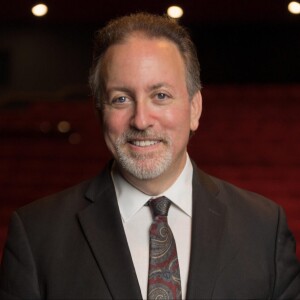
Monday Feb 10, 2025
Lucas Richman, Composing Music, Humanity, & Social Change
Monday Feb 10, 2025
Monday Feb 10, 2025
In this episode of One Symphony, Devin Patrick Hughes interviews Lucas Richman, a Grammy winning composer and conductor, exploring his career and insightful perspectives on music and its role in society.
Richman recounts his early exposure to music through composer biographies, sharing an anecdote about writing to Aaron Copland and receiving an encouraging postcard in return, which served as an early inspiration.
The discussion moves to Richman's experiences with Leonard Bernstein, highlighting a masterclass on the Academic Festival Overture and the profound impact Bernstein had on his understanding of music and life. Richman emphasizes Bernstein's ability to infuse everything with love and teaching, noting his preference for discussing music with doctors rather than musicians due to their focus on the art rather than business.
Richman discusses his approach to composition, emphasizing his commitment to bringing social issues and awareness into the concert hall. He describes his symphony inspired by Bernstein's words, "This will be our reply to violence is to make music more intensely, more beautifully, more devotedly than ever before," with movements embodying intensity, beauty, and devotion. He also discusses "The Warming Sea," a piece addressing climate change, and Paths to Dignity, a violin concerto inspired by the issue of homelessness. In Paths to Dignity, Richman musically portrays the word "dignity" using specific notes, aiming to create a conversation and raise awareness. He collaborated with Mitchell Newman, a violinist and advocate for the unsheltered community, to bring attention to the human stories behind homelessness.
Richman reflects on his time as an assistant conductor, which instilled in him the importance of clarity and efficiency. He describes his experience conducting film scores for movies such as Seven and The Village, noting the collaborative nature of the work. Richman also shares his perspective on conducting his own music, expressing that others often bring fresh interpretations that he appreciates.
Transitioning to the evolution of the conducting field, Richman acknowledges the influence of mentors like Daniel Lewis and Herbert Blomstedt, emphasizing the significance of respect, intent, and honesty. He expresses concern that some contemporary conductors prioritize showmanship over serving the music and fostering leadership skills.
Turning to the role of a music director, Richman underscores the importance of community engagement, fundraising, and collaboration with the board and staff. He highlights initiatives such as streaming concerts, expanding educational programs, and forging relationships with local organizations. He also touches on his involvement in music education, including his piece Behold the Bold Umbrellaphant, which introduces children to classical music through imaginative characters.
Thank you for joining us on One Symphony. Special thanks to Lucas Richman for sharing his music and story.
Musical selections from today’s episode:
Brahms: Academic Festival Overture, Op. 80 (Live). Lucas Richman conducting.
The Warming Sea composed by Lucas Richman. Performed by the Bangor Symphony Orchestra, Divisi Women’s Choir, and the Bangor Area Youth Choir. Conducted by Jayce Ogren. Commissioned by the Maine Science Festival.
Excerpts from Concerto for Violin: Paths to Dignity composed and conducted by Lucas Richman. Featuring Mitchell Newman on violin and the Bangor Symphony Orchestra.
“The Gravel Road” from the film The Village. Composed by James Newton-Howard and conducted by Lucas Richman featuring Hillary Hahn on violin.
“Tikkun Olam (Heal the World)” from Symphony: This Will Be Our Reply. Text and music by Lucas Richman. Performed by the Bangor Symphony Orchestra, conducted by Richman. Featuring the Oratorio Society and University of Maine Singers under the direction of Francis John Voight.
For more information on Lucas, see www.lucasrichman.com. You can always find more info at OneSymphony.podbean.com or DevinPatrickHughes.com, including a virtual tip jar if you’d like to support the show. Please feel free to rate, review, or share the podcast! Until next time, thank you for being part of the music.
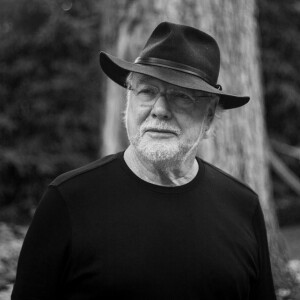
Wednesday Jan 22, 2025
Thomas W. Morris, Symphonic connector from Seiji Ozawa to John Williams
Wednesday Jan 22, 2025
Wednesday Jan 22, 2025
In this interview with Tom Morris, a veteran of orchestra management whose career included leadership roles with the Boston Symphony and the Cleveland Orchestra, conductor Devin Patrick Hughes provides a comprehensive look at the inner workings of orchestral institutions, the evolution of their management, and the crucial role of music in their success. Morris's journey from a percussionist to a top-level administrator offers a unique perspective, and his reflections provide valuable lessons for anyone interested in the performing arts.
One of the most compelling aspects of the interview is Morris's discussion of how his musical background shaped his management philosophy. He emphasizes his deep understanding of musicians' lives, having experienced firsthand the challenges and demands of performing in an orchestra. This empathy enabled him to build trust with musicians and approach labor negotiations with a unique perspective. Morris’s belief that "ultimately these institutions are about the music" underscores the importance of passion and artistic integrity in organizational leadership.
The episode also explores the historical evolution of orchestra management, particularly the Boston Symphony Orchestra. Morris recounts how, before the 1970s, the orchestra relied on simple postcards for subscription renewals. He explains that over the seventies and eighties, the percentage of the budget earned from ticket sales gradually fell. This shift necessitated the development of marketing and fundraising departments, leading to a significant increase in administrative staff.
Morris shares fascinating insights about the Boston Pops, emphasizing that it was founded in 1885, before Arthur Fiedler became its 17th conductor in 1929. The Boston Symphony created the Pops to provide more employment for musicians and to perform lighter music for a broader audience. He discusses how the Boston Symphony transformed Symphony Hall into a "beer hall" to accommodate a more informal setting for the Pops concerts. He explains that in the early days the Pops sold blocks of tickets to community groups and did not have to focus on individual ticket sales. He also recounts how the popularity of Arthur Fiedler was enhanced even further by the "Evening at Pops" television series. Morris details the process of selecting John Williams as Fiedler's successor, explaining that Williams was chosen for his musical integrity and knowledge of the symphony orchestra.
Furthermore, the interview addresses the crucial dynamic between management, the music director, and the board of directors, which Morris refers to as the "Bermuda Triangle.” Morris suggests that this structure can function perfectly if the right people are in those roles and are bound by a common vision. He also emphasizes that having a collaborative culture is essential, but that collaborative decision-making should be avoided. Morris stresses the importance of clear lines of authority and not settling for "good enough" when hiring. He also shares that when hiring he uses Jim Collins' three C's: competence, character, and chemistry. These points underscore the need for strong leadership and a shared vision in any successful organization.
Morris also touches on the importance of thoughtful programming. He humorously mentions his collection of "dumb programs" and emphasizes the importance of carefully considering the combination of pieces in a concert. He contrasts examples of bad programming with one of his favorites, a concert he organized with Christoph von Dohnányi, which combined pieces by Ligeti, Wagner, and Bruckner. This conversation highlights that thoughtful artistic direction is an essential element in the success of an orchestra.
Thank you for joining us on One Symphony. Special thanks to Thomas Morris for sharing his life and leadership. You can pick up a copy of Always the Music: How a Lifelong Passion Framed a Future for Orchestras wherever you get your books.
For a list of recordings played on today’s episode, please check out our show notes. You can always find more info at OneSymphony.podbean.com or DevinPatrickHughes.com, including a virtual tip jar if you’d like to support the show. Please feel free to rate, review, or share the podcast! Until next time, thank you for being part of the music.
https://www.alwaysthemusic.com
Featured Music
All music selections for this episode feature the Boston Pops.
Tchaikovsky’s Serenade for Strings in C Major, Op. 48: Waltz. Conducted by Arthur Fiedler, from the album Fiedler: Greatest Hits.
L'Arlésienne Suite No. 2: Farandole. Composed by Georges Bizet. Conducted by Arthur Fielder, from the album Fiedler: Greatest Hits.
“Manhattan Skyline.” From the album Disco Inferno / Manhattan Skyline. Conducted by Arthur Fiedler.
“I Got Rhythm, Embraceable You.” From the album Boston Pops Salutes Astaire, Kelly, Garland. Composed by George and Ira Gershwin. Conducted by John Williams.
“Flying Theme” from E. T. Composed by John Williams. Performed live by John Williams conducting the Boston Pops in 2002.
“America Medley: America.” From the album Salute to America. Composed by Leonard Bernstein. Lyrics by Stephen Sondheim. Conducted by John Williams.
“None But The Lonely Heart.” From the album Pops a la Russe. Composed by Pyotr Ilyich Tchaikovsky. Conducted by John Williams.
The Snow Maiden - Suite - Danse des Bouffons. Composed by Nikolai Rimsky-Korsakov. From the album Pops a la Russe. Conducted by John Williams.
Holst: The Planets, op.32: 3. Mercury, The Winged Messenger. From the album Boston Pops Orchestra: John Williams. Conducted by John Williams.
Overture from The Merry Wives of Windsor. From the album Fiedler: Greatest Hits. Conducted by Arthur Fiedler.
“Pizzicato Polka.” From the album 100 Fiedler Favorites. Conducted by Arthur Fiedler.
“Funeral March of a Marionette.” From the album 100 Fiedler Favorites. Conducted by Arthur Fiedler.

Tuesday Jan 07, 2025
George S. Clinton, Composing from Rock to Austin Powers
Tuesday Jan 07, 2025
Tuesday Jan 07, 2025
George S. Clinton is an award winning composer who has scored over 100 films, most notably “Austin Powers” !The Santa Clause”; “Mortal Kombat”; and the Emmy Award winning “Bury My Heart At Wounded Knee.”
He began his professional music career as a singer/songwriter in Nashville writing for Tree Music and doing session work. Upon moving to LA, he became a staff songwriter for Warner Brothers Music, with songs recorded by the likes of Michael Jackson and Joe Cocker. It was the music from Clinton’s forth album as a recording artist that attracted the attention of Cheech and Chong, giving him the chance to score his first film “Still Smokin’”.
Clinton has been an advisor at the Sundance Composers Lab, on the Music Executive Branch of The Oscars, and Chair of Film Scoring at the Berklee College of Music in Boston. Awards include Grammy and Emmy nominations, the SCL Ambassador Award, and nine BMI Film Music Awards, including their highest honor, the BMI Icon Award for career achievement.
Thank you for joining us on One Symphony. Thanks to George S. Clinton for sharing his life and music. You can find more info on Rose of Sonora at Roseofsonora.com. For a list of recordings played on today’s episode please check out our show notes.
You can always find more info at OneSymphony.org or DevinPatrickHughes.com including a virtual tip jar if you’d like to support the show. Please feel free to rate, review, or share the show! Until next time, thank you for being part of the music.
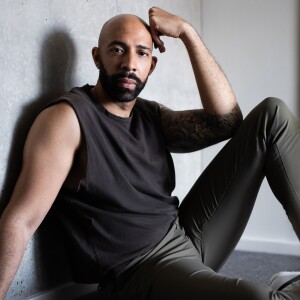
Monday Dec 23, 2024
Damien Geter: Composer, Singer, & Musical Guru
Monday Dec 23, 2024
Monday Dec 23, 2024
In this episode of One Symphony, host Devin Partick Hughes joins podcast, composer, conductor, and singer Damien Geter who shares his unique perspective on the world of opera and his approach to music. Geter's insights, drawn from his experiences as a performer, composer, and educator, offer a compelling look into the challenges and opportunities facing classical music today.
Geter’s current projects include a string orchestra piece, and he recently completed his fifth opera. He discussed his approach to composing, stating that he considers who will sing the parts, and that being a singer himself has given him a unique understanding of how to write for the voice. Geter explained that he doesn't find it hard to write an opera because he's been immersed in the world of opera for so long. His perspective is also informed by his experience conducting operas.
Geter also spoke about the process of putting an opera together. He explained the importance of a libretto workshop before writing the music. He also noted that there are many factors influencing the timeline for a production, including when the composer turns in the music and how organized the company is. Ideally, singers need a few months to learn their roles. He noted that some companies have unrealistic expectations about the time needed to create a new opera. Geter said that he would prefer to have two years to write an opera, but he's been doing it in six months lately and it feels rushed.
A key theme in the interview was the importance of representation in opera. Geter emphasized that people are more likely to engage with opera when they see themselves represented on stage. He noted that he didn't see many people who looked like him when he was growing up, and he wants to help Black and brown kids see that they can also pursue a career in classical music. He also spoke of the importance of partnering with communities to build audiences and secure funding, since American opera companies are not state-funded. He also pointed out the need for opera companies to mix new and old works, to appeal to both new and existing audiences.
Geter's approach to music is heavily influenced by the classical tradition, particularly composers like Beethoven and Brahms. However, he also incorporates elements of his background, such as his experience with jazz, his upbringing in the church, and his perspective as a Black person in the United States. He notes that his music will inherently have elements of his identity even if he's not intentionally writing about those experiences. He wants to have some years where he's not expected to write with a social bend.
Geter spoke about his love for history, which led to him co-authoring a book that examines the social and political context of Western European music. He pointed out that people will likely look back at the art of the 2016-2020 era and understand how much it was influenced by events of that time, such as the Black Lives Matter and Me-Too movements. In addition to his music career, Geter has also had some success as an actor, with a role in the television show Grimm.
Thank you for joining us on One Symphony. Thanks to Damien Geter for sharing his life and music. You can find more info at https://www.damiengetermusic.com. For a list of recordings played on today’s episode please check out our show notes.
You can always find more info at OneSymphony.org or DevinPatrickHughes.com including a virtual tip jar if you’d like to support the show. Please feel free to rate, review, or share the show! Until next time, thank you for being part of the music.
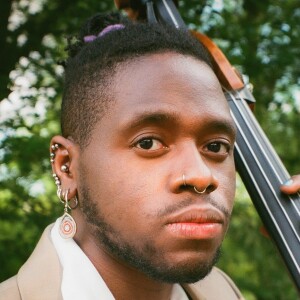
Monday Nov 11, 2024
Counter Classical: Kebra-Seyoun Charles on Redefining Classical Boundaries
Monday Nov 11, 2024
Monday Nov 11, 2024
In this episode of One Symphony with conductor Devin Patrick Hughes, Devin has an inspiring conversation with bass virtuoso and composer Kebra Seyoun Charles. From their early exposure to African drumming and gospel music to becoming a celebrated classical musician, Charles shares their unique journey and vision for the future of classical music through their "Counter Classical" style. Charles's work embodies a fresh perspective on classical music's future, one that honors tradition while embracing innovation and inclusivity. Their approach shows that classical music's evolution doesn't require abandoning its foundations, but rather expanding its boundaries to embrace diverse influences and experiences. As they put it, "Classical music is so beautiful and so ephemeral and it can't be contained."
Charles explores growing up in a musical household and how that led to their disvoery of the film composer, Erich Woflgang Korngold. They also discuss the autobiographical ballet project, Enby, that’s based on their experience as a nonbinary person developing in the world.
Kebra-Seyoun Charles is able to give prominence to the dance qualities in all forms of music. Kebra-Seyoun has performed alongside esteemed improvisers and composers such as Jon Batiste, at Carnegie Hall, and Tyshawn Sorey, at the New England Conservatory. Kebra-Seyoun was also featured in “Slugs’ Saloon” at the Institute of Contemporary Art in Boston, an interactive installation created by famed jazz musician and composer Jason Moran.
Kebra-Seyoun Charles is also a passionate chamber musician. Playing with groups like East Coast Chamber Orchestra, A Far Cry, Palaver Strings, and the Sphinx Virtuosi afford Kebra the opportunity to showcase virtuosity while still playing within an ensemble. A prime example of this is their tenure on the 2019 Emmy award-winning Broadway production “Hadestown”.
Thank you for joining us on One Symphony. Thanks to Kebra-Seyoun Charles for sharing their amazing spirit and music-making. You can find more info at https://www.kscharles.com. Recordings from the episode include:
Koussevitsky: Concerto for Double Bass, First Movement. Featuring Kebra-Seyoun Charles on Double Bass. Performed with the Boston Philharmonic Youth Orchestra, Benjamin Zander conducting.
Dating in NY. Composed by Kebra-Seyoun Charles. Featuring Charles on bass and musicians from the Juilliard School.
The third movement from Andres Martin’s Bass Concerto. Performed by Charles with the New World Symphony under the direction of Chad Goodman.
First movement from Erich Korngold’s Piano Quintet, op. 15. Performed by the ARC Ensemble from the Royal Conservatory, Toronto.
Erich Korngold’s Cello Concerto in One Movement. Featuring Victor Julien-Laferrière on cello performing with the Frankfurt Radio Symphony. Conducted by Marie Jacquot.
“Another Breakup Song.” Composed by Kebra-seyoun Charles. Featuring Charles on bass. Kayla Williams on viola, Joseph Brent on mandolin, Sommer Alteir on violin, and Kabir Adiya-Kumar on percussion.
“Galaxy,” composed by Xavier Foley. Featuring Kebra-seyoun Charles and Xavier Foley on bass accompanied by the Sphinx Virtuosi.
Holdberg Suite. Composed by Edvard Grieg. Performed by the Palaver Strings featuring Kebra-Seyoun Charles on bass.
You can always find more info at OneSymphony.org or DevinPatrickHughes.com including a virtual tip jar if you’d like to support the show. Please feel free to rate, review, or share the show! Until next time, thank you for being part of the music.
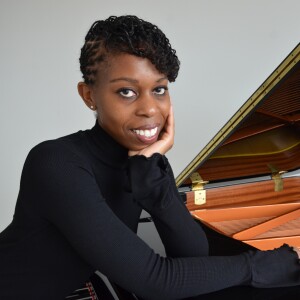
Monday Sep 23, 2024
Florence Price Illuminated with Samantha Ege
Monday Sep 23, 2024
Monday Sep 23, 2024
In this episode of One Symphony, host Devin Patrick Hughes interviews Dr. Samantha Ege, pianist and musicologist, about the life and works of Florence Price. Dr. Ege discusses Price's musical style, her significance in American classical music, and the recent rediscovery of her compositions. The conversation covers Price's role in the Chicago music scene, her blending of classical and African American musical traditions, and the challenges she faced as a Black female composer in the early 20th century. Dr. Ege also shares insights from her own recordings of Price's piano works and her upcoming scholarly publications on the composer.
Dr. Samantha Ege is a leading scholar and interpreter of the African American composer Florence Price. Her work illuminates Price in the context of the Black Chicago Renaissance and Black women's dynamic networks of advocacy, empowerment, and uplift. Her first book, South Side Impresarios: How Race Women Transformed Chicago's Classical Music Scene, and first edited collection, The Cambridge Companion to Florence B. Price, are important culminations of the research she has shared around the world.
Dr Ege is a also concert pianist who specializes in the music of 20th and 21st century composers. Her performances bring her research to life, sounding new narratives that are so often unheard in the modern-day concert hall. Dr Ege seeks to communicate the diversity of classical music's past, present, and future through her performances, and foster a sense of belonging for everyone.
In her London debut at the 2021 London Festival of American Music she gave the world premiere of Florence Price's complete Fantasie Nègre set. In 2018, she made her international lecture-recitalist debut at the Chicago Symphony Center with her event A Celebration of Women in Music: Composing the Black Chicago Renaissance. She has performed across the UK, Europe, North America, and Southeast Asia. She has also played with the Oxford Philharmonic Orchestra, Oakland Symphony Orchestra, Arkansas Symphony Orchestra, and Yale Philharmonia.
Thank you for joining us on One Symphony. Thanks to Dr. Samantha Ege for sharing her incredible research, insights, and music-making. You can find her book, South Side Impresarios and more at https://www.samanthaege.com.
Music Selections
“Weeping Willow, A Rag Time Two Step.” Composed by Scott Joplin. Performed by Benjamin Loeb on the album Scott Jopin: Piano Rags 2 from Naxos.
Violin Concerto No. 2. Composed by Florence Price. Featuring Kelly Hall-Tompkins on violin with the Urban Playground Chamber Orchestra. Conducted by Thomas Cunningham.
Sonata in E minor “Andante.” Composed by Florence Price. Performed by Samantha Ege.
“Sketches in Sepia.” Composed by Florence Price. Performed by Samantha Ege.
Symphony No. 1 in E minor: I. Allegro ma non troppo. Composed by Florence Price. Performed by The Philadelphia Orchestra. Yannick Nézet-Séguin, conductor. Available from Deutsche Grammophon.
Symphony No. 3 in C minor: I. Andante – Allegro. Composed by Florence Price. Performed by The Philadelphia Orchestra. Yannick Nézet-Séguin, conductor. Available from Deutsche Grammophon.
Sonata in E minor “Scherzo.” Composed by Florence Price. Performed by Samantha Ege.
Fantasie Nègre No.4 in B minor. Composed by Florence Price. Performed by Samantha Ege. Available from Lontano Records.
“Snapshots Moon Behind a Cloud.” Composed by Florence Price. Performed by Samantha Ege. Available from Lontano Records.
Fantasie Nègre No.1 in E minor. Composed by Florence Price. Performed by Samantha Ege. Available from Lontano Records.
Juba Dance from Symphony No. 3. Composed by Florence Price. Performed by the Chicago Symphony Orchestra. Ricardo Muti, conductor.
Fantasie Nègre No.2 in G minor. Composed by Florence Price. Performed by Samantha Ege. Available from Lontano Records.
You can always find more info at OneSymphony.org or DevinPatrickHughes.com including a virtual tip jar if you’d like to support the show. Please feel free to rate, review, or share the show! Until next time, thank you for being part of the music.

Saturday Aug 24, 2024
Tobias Picker, Voice of American Opera
Saturday Aug 24, 2024
Saturday Aug 24, 2024
Tobias Picker, deemed “our finest composer for the lyric stage” by The Wall Street Journal, joins Devin Patrick Hughes on One Symphony. Tobias is a prolific composer in all genres. He has composed six operas, commissioned by Dallas Opera, LA Opera, Metropolitan Opera, San Francisco Opera, Santa Fe Opera, and Opera Theatre St. Louis.
Tobias Picker has composed numerous symphonic works including three symphonies, concertos for violin, viola, cello, and oboe, as well as four piano concertos and a ballet. Picker’s recent honors include the 2020 Grammy Award for Best Opera Recording of Fantastic Mr. Fox, and a lifetime membership at the American Academy of Arts and Letters.
Thank you for joining us on One Symphony. Thanks to Tobias Picker for sharing his music and insights. Thank you to Visconti Arts for making this episode possible. You can find more info at https://tobiaspicker.com.
Music Selections—all music by Tobias Picker, except for the first selection.
Gian Carlo Menotti, Suite from Amahl and the Night Visitors. Performed by the Cleveland Pops Orchestra conducted by Louis Lane.
First movement from Symphony No. 1; performed by the San Francisco Symphony. Edo de Waart, conductor.
Awakenings, adapted from the non-fiction book by Oliver Sacks. Libretto by Aryeh Lev Stollman, produced by Odyssey Opera in 2023 of Boston in partnership with the Boston Modern Orchestra Project. Gil, Rose, Conductor. Directed by James Robinson. Commissioned by Opera Theatre of St. Louis.
The Encantadas for narrator and orchestra. Based on the writings of Herman Melville. Sir John Geilgud, narrator; Christoph Eschenbach, conductor; Houston Symphony Orchestra.
"Letter Aria" from Emmeline. Text by J.D. McClatchy Virginia Douglas, soprano Amir Farid, piano. Conducted by Modestas Pitrenas. Supported by Modestas Pitrenas.
“I See A Woman” from Lili Elbe. Text by Aryeh Lev Stollman. Featuring Lucia Lucas as Lili. Performed by the St. Gallen Symphonic Orchestra.
Old and Lost Rivers, for orchestra. Performed by the London Symphony Orchestra conducted by John Williams.
Nova featuring Benjamin Hudson- Violin John Graham - Viola Fred Sherry - Cello Don Palma - Bass Tobias Picker – Piano.
You can always find more info at OneSymphony.org including a virtual tip jar if you’d like to support the show. Please feel free to rate, review, or share the show! Until next time, thank you for being part of the music.
https://tobiaspicker.com
https://www.fox21news.com/business/press-releases/ein-presswire/674899601/devin-patrick-hughes-arapahoe-philharmonic-conductor-presents-a-new-discovery-concert-this-holiday-season/
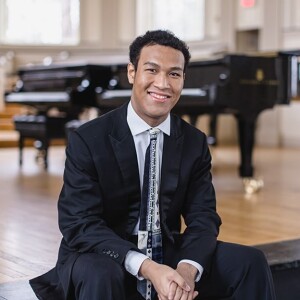
Wednesday Aug 07, 2024
Clayton Stephenson, Pianist and Renaissance Man
Wednesday Aug 07, 2024
Wednesday Aug 07, 2024
American pianist Clayton Stephenson joins conductor Devin Patrick Hughes for an engaging and informative interview on One Symphony. Clayton’s love for music is immediately apparent in his joyous charisma onstage, expressive power, and natural ease at the instrument. Hailed for “extraordinary narrative and poetc gifts” and interpretations that are “fresh, incisive and characterfully alive” by Gramophone, he is committed to making an impact on the world through his music-making.
Clayton and Devin discuss Clayton’s upbringing, his first keyboard and piano courtesy of Lang Lang, his thoughts on performing music new and old, being a young musician, studying economics at Harvard, best health practices and more!
Thank you for joining us on One Symphony. Thanks to Clayton Stephenson for sharing his music and performances. Thank you to the Cliburn and International Keyboard Odyssiad and Festival for making this episode possible. You can find more info at https://claytonstephenson.com.
For a list of recordings played on today’s show see our show notes online.
Rachmaninoff Piano Concerto no. 3 Fort Worth Symphony with Marin Alsop conducting
Art Tatum’s Tea for Two
Bach Busoni Chaconne in D minor
Beethoven Piano Sonata no. 23 in F minor Op. 57
Gershwin Summertime
Bach Jesu, Joy of Man’s Desiring
You can always find more info at OneSymphony.org including a virtual tip jar if you’d like to support the show. Please feel free to rate, review, or share the show! Until next time, thank you for being part of the music!
https://claytonstephenson.com
https://www.muvac.com/en/profile/devin-patrick-hughes
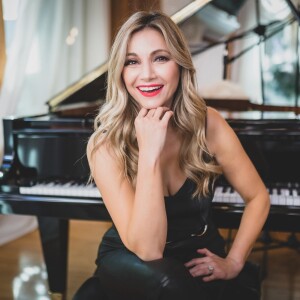
Monday Jun 24, 2024
Marina Arsenijevic, Pianist Preaching Unity Through Diversity
Monday Jun 24, 2024
Monday Jun 24, 2024
In this episode of One Symphony, conductor Devin Patrick Hughes interviews acclaimed pianist and composer Marina Arsenijevic to discuss her journey that led to her latest album, Chopin Obsessions. Arsenijevic shared insights into her upbringing in former Yugoslavia, the influences that shaped her musical style, and her unwavering commitment to promoting unity through diversity. Marina Arsenijevic is as an inspiration to artists and audiences alike. Her journey of unity through diversity reminds us of the transformative power of music and its ability to bring people together, even in the most challenging of times. Growing up in a communist country, Arsenijevic was exposed to a wide range of musical genres, from Western pop to traditional Balkan music, which would later play a significant role in shaping her unique compositional style. As the disintegration of Yugoslavia began in the early 1990s, Arsenijevic found solace in her music. She recognized the power of music to transcend borders and bring people together, even in the face of conflict and adversity. “I wanted to show our common humanity through history, culture, through music, so I started to blend diverse melodies and rhythms to unite us,” she explained.Arsenijevic's commitment to promoting unity through diversity led to the creation of her PBS special, Marina at West Point: Unity Through Diversity. The concert, which featured the West Point Chorus and Band, showcased a diverse range of musical styles and pieces from Gershwin's Rhapsody in Blue to Freddie Mercury's "Bohemian Rhapsody" alongside Arsenijevic's own compositions. The special aimed to share Arsenijevic's message with a wider audience.During the interview, Arsenijevic also discussed her latest album, Chopin Obsessions. She discussed the influence of Chopin's relationships with aristocratic women on his compositions and the evolution of his musical style throughout his career. Arsenijevic also drew parallels between Chopin and other composers of the Romantic Era. When asked about her advice for young composers and pianists, Arsenijevic emphasized the importance of using one's own cultural background and traditional music. She encouraged artists to explore the melodies and rhythms of their heritage and incorporate them into their compositions.
MARINA ARSENIJEVIC is an international award-winning pianist and composer, star of the Emmy-nominated Public Television program, “Marina at West Point: Unity through Diversity”which has been broadcast to more than 170 Million viewers on PBS Stations all across the country. Marina created the program and performed with the 120-member joint ensemble of the West Point Band and West Point Cadet Glee Club. The Concert was recorded live at West Point’s historic Eisenhower Hall and as of 2020 become one of the longest running single concerts at PBS TV Network.
Thank you for joining us on One Symphony. Thanks to Marina Arsenijevic for sharing her music and performances. You can find more info at https://www.marinainamerica.com/home
The following music was heard on today’s episode:
“A Piece of My Sky” composed and performed by Marina Arsenijevic.“Gypsy Suite” from the album My Balkan Soul, composed and performed by Marina Arsenijevic available from KM Records. “Armed Forces Medley” performed by Marina with the West Point Cadet Glee Club and the West Point Band from the PBS special Marina at West Point: Unity Through Diversity. The cadenza and finale from Tesla Rhapsody, composed by Marina made possible by the Gold Spirit Award from the Tesla Science Foundation. Chopin’s Waltz in A-flat Major op 42, Fantaisie-impromptu, Op.66, and Ballade No. 1 in G minor, performed by Marina on the album Chopin Obsession available from United World Bravo Music. “Homolje” from the album Balkan Sounds. Composed and performed by Marina Arsenijevic and the Servian Chamber Orchestra and Chorus. Arranged by Zoran Hristic. Available from United World Bravo Music.
You can always find more info at OneSymphony.org including a virtual tip jar if you’d like to support the show. Please feel free to rate, review, or share the show! Until next time, thank you for being part of the music!
https://www.marinainamerica.com/performances
https://www.priceattractions.com/devin-patrick-hughes-conductor
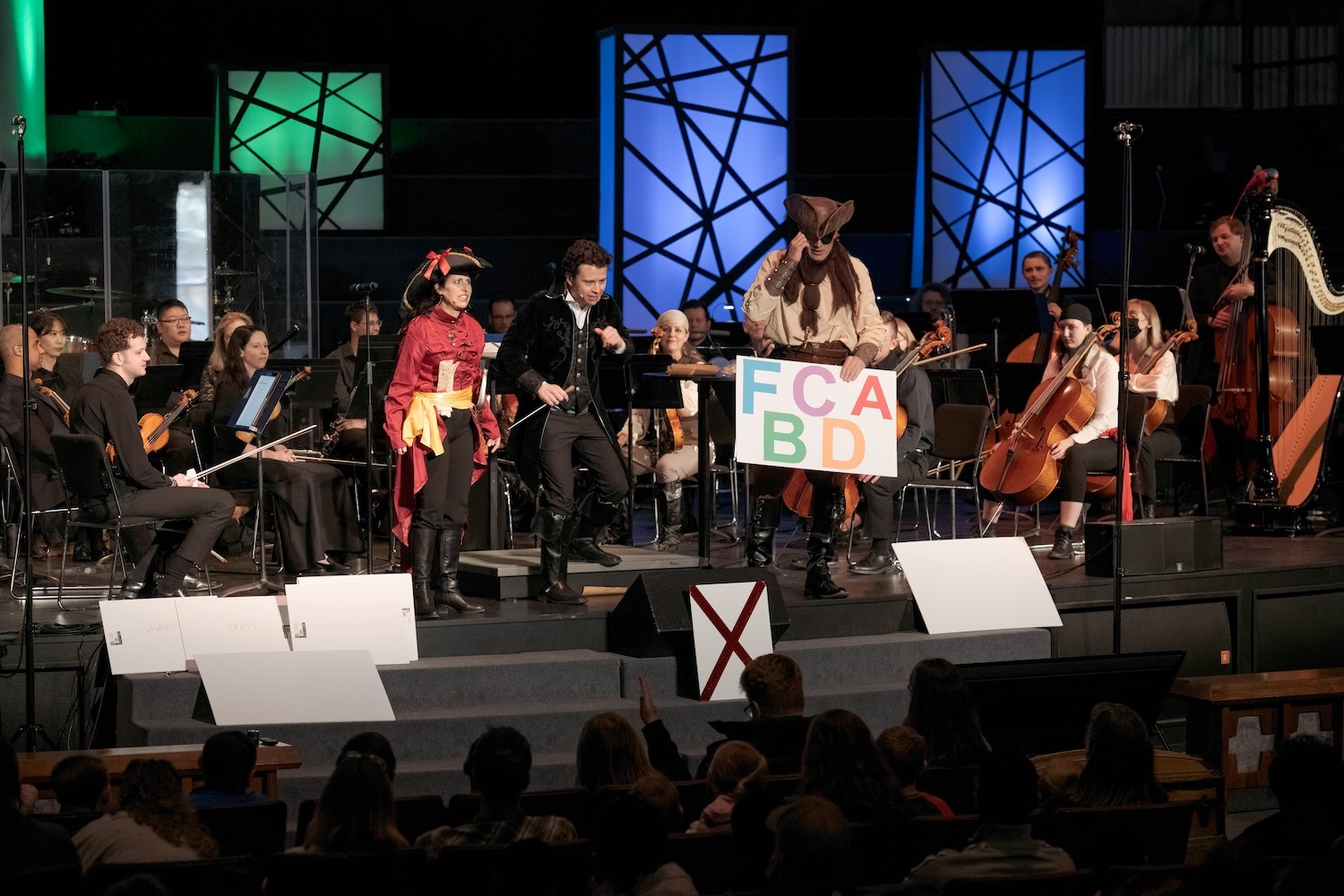
Featured Episode
Join writer and performer Dominique Christina, in a discussion which covers craft and performance, the etymologies of words, the importance of learning from past poets like Edgar Allen Poe and Beethoven, and the relationship between artists and politicians.
In additional to some amazing musical selections Dominique shares two of her more recent poems, It’s Morning and Praise Poem at the end of the episode.
“Sometimes the most radical thing you can do is to be still and listen, to be soft, to be nurturing, to be caring, to be empathetic, to keep your heart open, to keep your hands open. That’s radical stuff, it’s not the smashing of things, the breaking of things, the setting of fires, it’s not. The most radical stuff is to lead with love, to be human, to remain human, when there’s so many opportunities for you to be brutish, or disconnected from your heart, to remain available is radical.”









